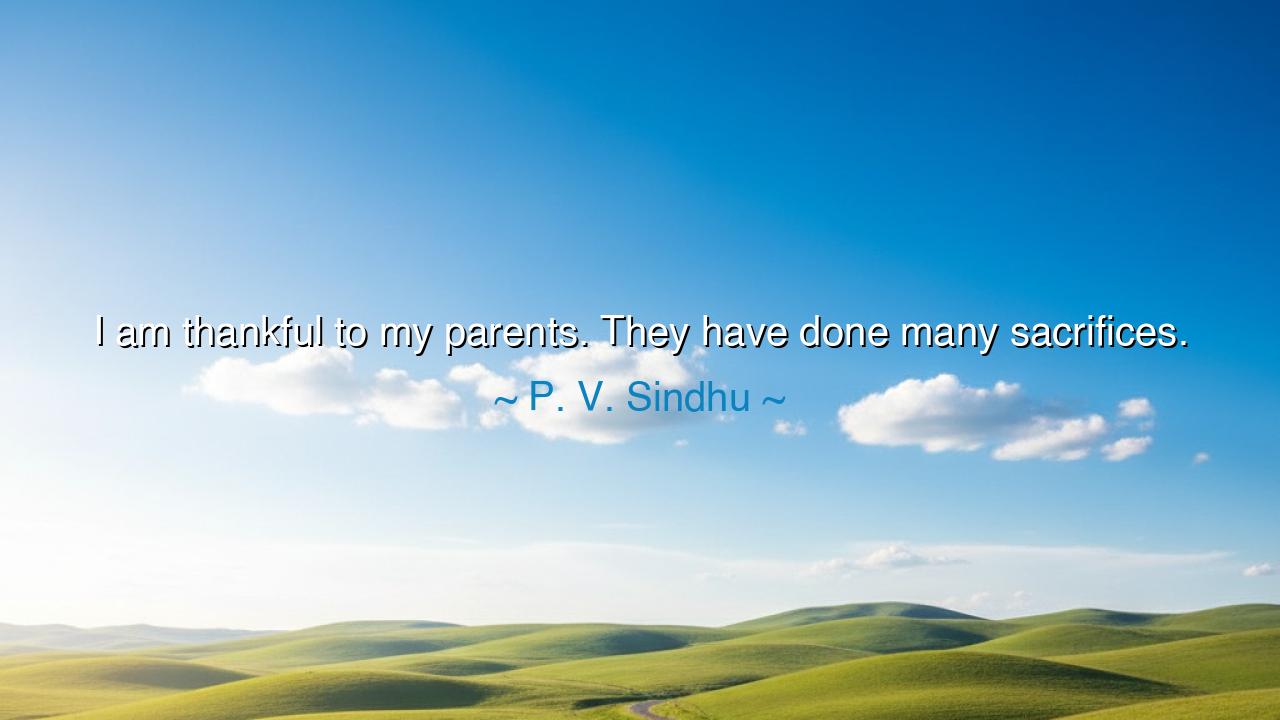
I am thankful to my parents. They have done many sacrifices.






When P. V. Sindhu declares, “I am thankful to my parents. They have done many sacrifices,” she speaks with the voice of a daughter who has seen the weight her family bore so that she could rise. These words are not mere courtesy; they are the outpouring of a heart that recognizes her triumphs on the court were never hers alone. For every medal she has won, there are countless unseen moments of sacrifice—of sleepless mornings, of endless support, of burdens carried in silence by those who loved her most.
Her words draw attention to a truth often forgotten: no champion stands alone. Behind every athlete, every leader, every creator, there is a foundation built by parents who dreamed, who toiled, who gave more than they kept for themselves. In Sindhu’s case, her parents—both former volleyball players—laid not only the physical groundwork but also the emotional strength that carried her into badminton glory. Their sacrifices carved a path for her future, and her thankfulness is the mark of one who remembers where she came from.
History remembers countless stories of greatness built on parental sacrifice. Consider Thomas Edison, whose mother withdrew him from school and taught him herself when teachers dismissed him as unteachable; her faith and dedication nurtured one of the greatest inventors the world has known. Or think of Serena and Venus Williams, whose father, Richard Williams, trained them relentlessly on cracked courts, pouring his life into their careers so they could become legends. In each story, as with Sindhu, the brilliance of the child shines brighter because of the hidden labor of the parents.
Sindhu’s recognition of these sacrifices is not only humility—it is wisdom. Many in positions of greatness forget the price paid by others for their ascent, but she does not. By being openly thankful, she anchors her success not in self alone but in the bonds of family. This gratitude ensures her victories are not monuments to ego but testaments to love, resilience, and shared labor across generations.
The very word sacrifice carries deep weight. It means to give up something cherished for the sake of another. Parents sacrifice comfort, wealth, time, and even their own dreams so that their children may soar higher. Sindhu’s acknowledgment transforms their private struggles into eternal honor, ensuring the world knows that behind the medals stands the quiet heroism of a mother and father.
For those who listen, the teaching is clear: never forget the ones who lifted you. If you stand tall, it is because others stooped low to carry your weight. If you see far, it is because you were placed on shoulders stronger than your own. Be thankful, not only in words but in deeds—care for your parents, honor their sacrifices, and live in a way that reflects the values they instilled in you.
So I say to you, children of tomorrow: when success finds you, do not let pride erase memory. Speak as Sindhu spoke—of thankfulness, of parents, of sacrifice. For greatness without gratitude is hollow, but greatness that remembers its roots becomes eternal, echoing not just in the arenas of the present but in the hearts of generations yet to come.






AAdministratorAdministrator
Welcome, honored guests. Please leave a comment, we will respond soon